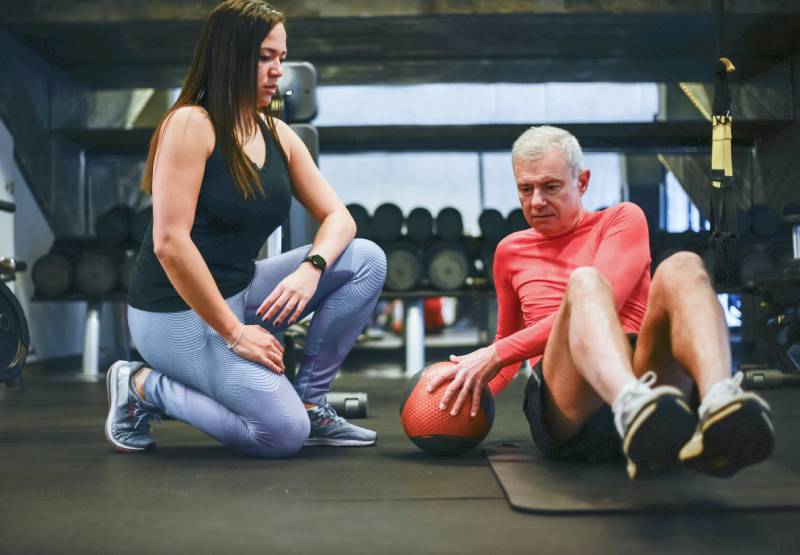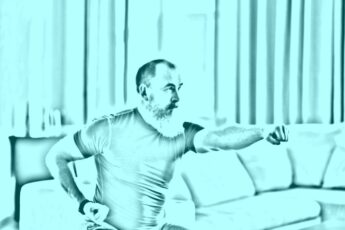Last Updated on November 30, 2023 by Local Trainer
Finding the right physical trainer for seniors is essential for maintaining a healthy and active lifestyle. As we age, it becomes increasingly important to prioritize our physical well-being, and working with a qualified professional can make all the difference.
In this article, we will provide you with valuable tips and insights on how to establish a successful partnership with a physical trainer who specializes in senior fitness. From understanding your specific needs and goals to assessing the trainer’s qualifications and experience, we will guide you through the process of finding the perfect fit for your unique requirements.
Maintaining mobility, strength, and overall health as a senior can greatly improve our quality of life and even help prevent certain age-related conditions. By partnering with the right physical trainer, you can receive personalized guidance, support, and motivation to keep you on track and enjoying an active lifestyle well into your golden years.
Get ready to embark on a journey to finding the perfect physical trainer who will help you stay fit, healthy, and energized as you age gracefully.
Importance of physical fitness for seniors
Physical fitness is crucial for seniors as it has numerous benefits for their overall health and well-being. Regular exercise helps maintain muscle mass, bone density, and cardiovascular health, reducing the risk of falls, osteoporosis, heart disease, and other age-related conditions. Additionally, exercise improves balance, flexibility, and mobility, allowing seniors to maintain their independence and perform daily activities with ease.
However, many seniors may be unsure where to start or lack the motivation to exercise regularly. This is where a physical trainer can be instrumental in providing guidance, support, and personalized fitness programs tailored to their specific needs and abilities. A physical trainer can help seniors set realistic goals, monitor progress, and make necessary adjustments to ensure optimum results.
Benefits of working with a physical trainer
Working with a physical trainer offers numerous advantages for seniors. Firstly, a trainer can provide expert guidance on proper form and technique, reducing the risk of injury during exercise. They can also customize workouts to accommodate any existing health conditions, ensuring safety and effectiveness.
Moreover, a physical trainer provides the motivation and accountability seniors may need to stick to their fitness routine. They offer encouragement, support, and a structured program that keeps seniors engaged and committed to their exercise regimen. Additionally, a trainer can help seniors overcome any barriers or challenges they may face, adapting exercises to their abilities and providing modifications when necessary.
Understanding the specific needs of seniors
When looking for a physical trainer, it’s important to find someone who understands the specific needs and concerns of seniors. Aging bodies have unique requirements, and trainers who specialize in senior fitness are well-versed in addressing these needs.
One essential aspect to consider is the trainer’s knowledge of age-related conditions and their ability to adapt exercises accordingly. They should be familiar with common issues such as arthritis, osteoporosis, and joint pain, and be able to modify workouts to accommodate these conditions. It’s crucial that the trainer understands the limitations and potential risks associated with aging, ensuring exercises are safe and suitable for seniors.
Additionally, a trainer who is knowledgeable about nutrition and can provide guidance on healthy eating habits for seniors is a valuable asset. Proper nutrition is key to maintaining overall health and supporting exercise performance, and a trainer who can offer advice in this area will contribute to a well-rounded fitness program.
Qualities to look for in a physical trainer for seniors
When searching for a physical trainer for seniors, there are several key qualities to look for:
1. Experience with senior fitness: Look for a trainer who has specific experience working with seniors. They should have a track record of successful outcomes and be able to provide references from satisfied clients.
2. Certifications and qualifications: Ensure the trainer holds appropriate certifications and qualifications in fitness training. Look for certifications from reputable organizations such as the National Academy of Sports Medicine (NASM) or the National Strength & Conditioning Association (NSCA).
3. Excellent communication skills: A good trainer should be able to effectively communicate and explain exercises, techniques, and goals to seniors. They should be patient, understanding, and able to adapt their communication style to suit individual needs.
4. Empathy and compassion: Seniors may face unique challenges and have specific concerns when it comes to exercise. A trainer who is empathetic, understanding, and genuinely cares about the well-being of their clients will create a positive and supportive environment.
5. Adaptability and flexibility: Seniors have different abilities, fitness levels, and health conditions. A good trainer should be able to adapt exercises to accommodate these differences and provide modifications when necessary.
6. Continued education and staying up-to-date: Look for a trainer who demonstrates a commitment to staying current with industry trends and research. They should regularly update their knowledge and skills to provide the best possible guidance to seniors.
Questions to ask when interviewing potential trainers
When interviewing potential trainers, it’s important to ask the right questions to assess their suitability for your specific needs. Consider asking the following:
1. What experience do you have working with seniors?: This will help determine if the trainer has the necessary expertise in senior fitness.
2. What certifications and qualifications do you hold?: Verify that the trainer has the appropriate credentials and certifications.
3. How would you tailor exercises to accommodate any existing health conditions?: This will give you insight into the trainer’s ability to adapt exercises to individual needs.
4. How do you provide motivation and support to clients?: Assess the trainer’s ability to provide the encouragement and support seniors may need to stay motivated and committed to their fitness journey.
6. Do you offer a free consultation or trial session?: Taking advantage of a free consultation or trial session can help you gauge the trainer’s style, personality, and compatibility with your preferences.
Remember, finding the right physical trainer is a personal decision, and it’s important to choose someone who aligns with your goals, preferences, and comfort level.
Developing a personalized fitness plan for seniors
Once you have found the right physical trainer, they will work with you to develop a personalized fitness plan tailored to your specific needs, abilities, and goals. This plan will take into account any existing health conditions, fitness levels, and preferences.
The trainer will conduct an initial assessment to evaluate your current fitness level, range of motion, strength, and any areas of concern. They will also discuss your goals, whether it’s improving mobility, increasing strength, or overall well-being. Based on this assessment, the trainer will design a customized program that includes a variety of exercises to target different muscle groups and address specific needs.
The fitness plan may include a combination of cardiovascular exercises, strength training, balance and flexibility exercises, and functional movements that mimic daily activities. The trainer will provide guidance on proper form and technique to ensure exercises are performed correctly and safely. They will also gradually progress the intensity and difficulty of the workouts as your fitness level improves.
Monitoring progress and making adjustments
Regular monitoring of progress is crucial to ensure you are on track to achieving your goals. Your physical trainer will track your progress through various methods, such as measuring strength gains, improvements in balance and flexibility, and changes in body composition. They may also use fitness assessments and functional movement screenings to evaluate your overall fitness level.
Based on the progress assessments, the trainer will make necessary adjustments to your fitness plan. This may involve increasing the intensity of certain exercises, introducing new exercises, or modifying the program to target specific areas for improvement. The trainer will continue to challenge you while ensuring exercises remain safe and suitable for your abilities.
Tips for building a successful partnership with a physical trainer
Building a successful partnership with your physical trainer is crucial for achieving your fitness goals. Here are some tips to help establish a positive and productive working relationship:
1. Clearly communicate your goals and expectations: Let your trainer know what you hope to achieve and any specific concerns or limitations you may have. This will help them design a program that aligns with your objectives.
2. Be open and honest: Share any changes in your health, physical abilities, or lifestyle with your trainer. This will allow them to make necessary adjustments to your fitness plan and ensure your safety.
3. Follow the trainer’s guidance: Trust in your trainer’s expertise and follow their instructions. They have your best interests in mind and will guide you towards achieving your goals safely and effectively.
4. Ask questions and seek clarification: If you have any doubts or concerns, don’t hesitate to ask your trainer for clarification. They are there to provide guidance and support, and clear communication is key to a successful partnership.
5. Stay committed and consistent: Consistency is key when it comes to achieving fitness goals. Make a commitment to follow your trainer’s program and attend scheduled sessions regularly. The more consistent you are, the faster you will see results.
6. Provide feedback: Regularly communicate with your trainer and provide feedback on how the program is working for you. This will help them make necessary adjustments and tailor the program to your evolving needs.
Remember, building a successful partnership takes time and effort from both sides. By staying committed, communicating openly, and trusting in your trainer’s expertise, you can achieve great results together.
Resources for finding physical trainers for seniors
Finding a physical trainer who specializes in senior fitness can be made easier with the help of various resources. Consider the following options:
1. Ask for recommendations: Seek recommendations from friends, family, or healthcare professionals who have experience with physical trainers for seniors. Their firsthand experiences can provide valuable insights.
2. Check with local senior centers or community organizations: Many senior centers or community organizations offer fitness programs or can provide recommendations for physical trainers who work with seniors.
3. Search online directories: Utilize online directories that specialize in connecting individuals with fitness professionals. Look for trainers who have experience and qualifications in senior fitness.
4. Contact local gyms or fitness centers: Inquire if they have trainers who specialize in senior fitness or can provide recommendations.
5. Attend fitness expos or events: Fitness expos or events often have booths or presentations by trainers specializing in various areas, including senior fitness. Take the opportunity to speak with trainers directly and ask questions.
Conclusion
Finding the right physical trainer for seniors is crucial for maintaining a healthy and active lifestyle. With their expertise, guidance, and support, you can experience the numerous benefits of regular exercise tailored to your specific needs and goals. Remember to consider the trainer’s experience, qualifications, and ability to adapt exercises to suit seniors’ unique requirements.
Building a successful partnership with your trainer involves clear communication, trust, and commitment from both sides. By following these tips and utilizing available resources, you can find the perfect physical trainer who will help you age gracefully, stay fit, and enjoy a high quality of life
Local Trainer




